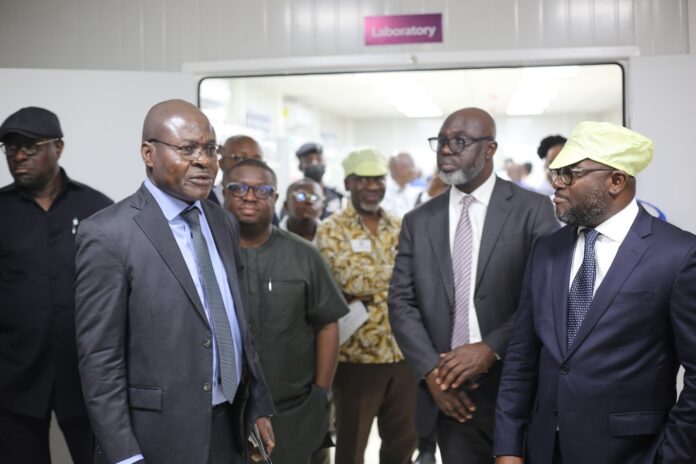
The establishment of a public utilities metrology laboratory by the Ghana Standards Authority (GSA) has been described as a significant stride toward bolstering efforts to ensure national standardisation across the diverse sectors of the economy.
Deputy Minister of Energy, Andrew Kofi Egyapa Mercer, commenting on the newly established lab, emphasised its role in enhancing precision and reliability in measurements across public utilities.
He noted that the creation of the advanced laboratory, as part of GSA’s mandate under Legislative Instrument (LI) 2413, “aligns seamlessly with the pertinent regulations governing the electricity sector”.
He said these regulations, among other provisions, emphasise the need for an impartial and transparent mechanism in addressing disputes relating to electricity consumption. He added that consumers are entitled to an independent third-party verification as part of the assessment when such disputes arise.
Given this, he expressed confidence that the Public Utilities Regulatory Commission (PURC) would harness the facility’s capabilities to ensure fair and unbiased assessment.
Also, he said the government is committed to the core principles of efficient service delivery, financial reliability of utilities, and uninterrupted supply of energy. But these, he recognised, rely on efficient revenue collection and a robust metring system.
Traditionally, utilities have employed their testing facilities to meet these standards. However, it is given this that he said: “The establishment of this independent metre testing laboratory is not just a welcome addition, but a critical step toward achieving our national standardisation goals”.
This milestone aligns with Ghana’s broader vision for economic development, emphasising the need for standardised measurements to drive efficiency, consumer confidence, and international competitiveness.
The development was also noted to be reflective of the commitment of GSA to adopt best practices and cutting-edge technologies in line with global standards.
The deputy minister recognised that one of the persistent challenges hindering the electricity distribution sub-sector has been the lack of adequate metring infrastructure for all consumer categories.
This is compounded by several occurrences, including the use of different metring technologies which make the integration with a common metre management system difficult, he said.
But these challenges, the minister remarked, including the integration issues, have largely been addressed leaving other metre installation concerns remaining.
He was, therefore, hopeful that the inauguration of the national metring testing facility would significantly enhance metre testing processes and serve as a crucial tool in overcoming the historical impediments.
The Public Utilities Metrology Laboratory was realised through the partnership of GSA and the UCL Group, which consists of UCL Ghana Limited and UCL Synergy Limited – duly registered private limited liability companies in Ghana.
The purpose of the Private Support Sector Programme – Metrology Services (PSSP-MS) is to protect energy domestic consumers, businesses and industries by ensuring that equity prevails in all commercial transactions involving the determination of energy usage through installed metres.
The Director-General of GSA, Prof. Alex Doodo, during his remarks to officially open the facility, maintained that the Public Utilities Regulatory Commission’s legislation, LI 2413, enjoins all metres to be used for public utilities to undergo certification and testing.
This, he stated, is expected to be done by GSA to ensure that trading within the industry is fair and that consumers are protected.
This is further backed by the Ghana Standards Authority Act, 2022, Act 1078, which makes provision for the appointment of a Custodian-General who, by gazette, is mandated to ensure that all equipment used for measuring in trade industry, health and commerce conform to national standards.
Against this backdrop, he assured that he has been positioned to work with industry and consumers to ensure that there is fairness in buying and selling; to keep the industry efficient and modern; and not overburden industry or consumers.
He, therefore, assured that GSA is committed to working with all the relevant stakeholders to realise the mandate given.
The Chairman of the Governing Board of GSA, Prof. Felix Charles Mills-Robertson, also in brief remarks at the programme, noted that the development will ensure that all those who rely on public utilities like electricity will receive exactly what they pay for, and are equally charged for what they consume.









